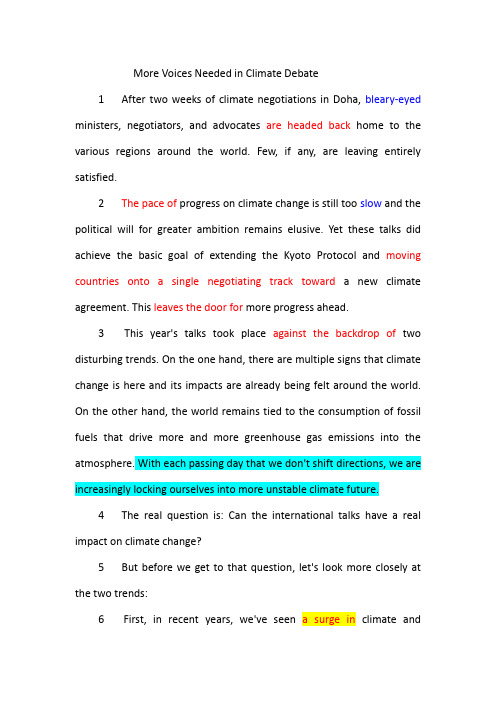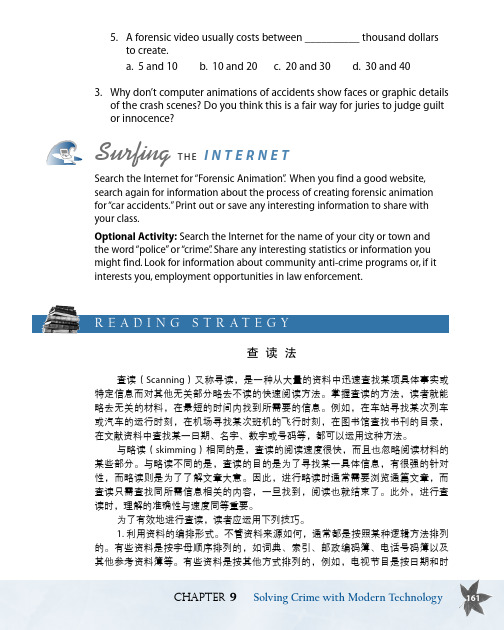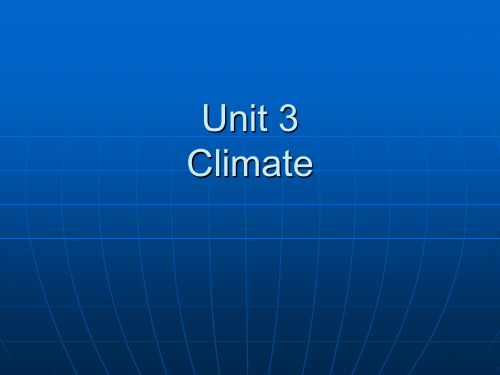大学英语泛读教程2PPT教学课件-Unit 3
大学英语2第三单元课件ppt课件

Clear teaching objectives
01
Knowledge objectives
To help students master the language knowledge related to
travel, including words, phrases, sentence structures, etc
Oral expression and role play
要点一
Language output
Oral expression and role play are important language output activities that can help students improve their language ability
03 Reading comprehension and arti
Background introduction of reading material
The background information of the selected reading material
The purpose and significance of the reading material
To help students develop their interest in foreign languages,
enhance their cross cultural awareness and ability to deal with
problems in cross cultural communication
要点三
Oral expression skills
《英语泛读教程2》教案

Extensive Reading (Book 2)Unit 1 The Shadowland of DreamsI. Teaching ObjectivesGo over the whole text in limited time and try to get the main idea of the passageGet some information about the author Master the Reading skillsII. Teaching Importance and Difficulties1. The usage of new words and phrases2. Using context clues to find out the meaning of words3. Understanding paragraphs-How to identify the Main Idea.4. Reading skills: Using the DictionaryIII. Teaching Methods: Discussing, Practicing, and Exercising.IV. Teaching Time: 4 periodsV. Teaching Content1. Lead-inWhat are your dreams?What will you do if you meet some troubles on the course of realizing your dream? 2. Related information1) author亚历克斯•哈利(1921-1992)Alexander Murray Palmer Haley (August 11, 1921-February 10, 1992) was an American writer. He is best known as the author of Roots. 非洲裔的美国作家。
泛读课程2 unit3

More Voices Needed in Climate Debate1 After two weeks of climate negotiations in Doha, bleary-eyed ministers, negotiators, and advocates are headed back home to the various regions around the world. Few, if any, are leaving entirely satisfied.2 The pace of progress on climate change is still too slow and the political will for greater ambition remains elusive. Yet these talks did achieve the basic goal of extending the Kyoto Protocol and moving countries onto a single negotiating track toward a new climate agreement. This leaves the door for more progress ahead.3 This year's talks took place against the backdrop of two disturbing trends. On the one hand, there are multiple signs that climate change is here and its impacts are already being felt around the world. On the other hand, the world remains tied to the consumption of fossil fuels that drive more and more greenhouse gas emissions into the atmosphere. With each passing day that we don't shift directions, we are increasingly locking ourselves into more unstable climate future.4 The real question is: Can the international talks have a real impact on climate change?5 But before we get to that question, let's look more closely at the two trends:6 First, in recent years, we've seen a surge in climate andextreme weather events, along with analysis and other evidence that the world is on an unsustainable course. The most recent and tragic example was Super Typhoon Bopha that swept across the Philippines this week, killing at least 500 people and leaving tens of thousands displaced. Typhoons aren't unusual in the Philippines, but this one is the most southern on record and it arrived particularly late in the year. The storm, of course,comes on the heels of Hurricane Sandy, which swept through the Caribbean and up the East Coast of the United States, leaving hundreds dead, and thousands without power or property. These are the kind of extreme weather events that are becoming more common in a warming world. Last month, the US government has just reported, was the 332nd in succession in which the global temperature was above the average for the 20th century: though individual areas have sometimes suffered cold spells, the last below-average month worldwide was February 1985. And the effects are increasingly showing. Already we are seeing that polar ice is melting faster than expected and sea levels are rising beyond many projections. For instance, NOAA (US National Oceanic and Atmospheric Administration) just released a study showing that sea levels could rise as much as 6.6 feet by the end of the century.7 The World Bank's report, "Turning Down the Heat," explores a world with four degrees Celsius of global temperature growth. The picture is not pretty. Four degrees would bring more intense wildfires,heat waves, and withering droughts. Ocean life would die off, while pests and disease would increase, the report says. The European Environment Agency this week published a 300-page report detailing the impact of global warming on the continent, from crops to coasts, floods to forests —and earlier this year the giant Climate Vulnerability Monitor report concluded that it was already costing about 1 per cent of global GDP and, together with the carbon-based economy, causing five million deaths a year, mainly in poor countries.8 That brings us to the second major trend, which is the world's ongoing dependence on fossil fuels. WRI (World Resources Institute) recently released an analysis showing that there are nearly 1,200 new proposed coal plants worldwide. While not all of these will be developed, even a fraction of them would drive up global emissions. Oil, likewise, remains a dominant fuel source. And, despite the enormous profits, the International Energy Agency has reported that government subsidies for fossil fuels were six times those for renewable energy in 2011. This dependence on fossil fuels keeps pushing up the global emissions. Total annual greenhouse gas emissions have increased by about a third over the past decade, and carbon dioxide concentrations in the atmosphere are now higher than at any time in the past 15 million years.9 That's why what happens in the global climate agreements is so crucial. The UN is the only venue that brings all countries togetherand gives each a chance to have a voice. It provides a common arena that enhances transparency and accountability among countries. Of course, the international system cannot solve the problem on its own. We need business leaders, government officials, and the public to step up as well. We need more of their voices in the debate. Fortunately, public understanding of climate change is on the rise, as is support for action. Greater domestic action can instill confidence and help build momentum. With more national leadership, the UN can move faster and take a bigger bite out of global emissions.10 Turning again to the Doha meeting, it's certainly clear that the meeting alone won't do enough to address this issue. But it does put countries on a track and provides them with the opportunity to raise their ambition.11 The big task, therefore, is to make progress on a commitment made at the last climate summit, in Durban in 2011, to reach a new agreement "with legal force" by 2015, binding all countries to control emissions. This, in itself, was a breakthrough, and there are some reasons for cautious optimism that progress will continue.12 Many of the obstacles to progress in the past are diminishing. The United States —through regulation and using shale gas —is likely to hit its target fo r reducing emissions by 17 percent by 2020, and President Obama has started to talk about acting on climate change, forthe first time in years, after his election and Super-storm Sandy. Saudi Arabia, long the strongest opponent of change, is now investing heavily in solar power. China is starting its own emissions trading scheme to control carbon releases, and its new leadership is expected to give a higher priority to the environment.13 It's time for world leaders, negotiators and the public to increase their intensity, to develop more specific strategies, and deliver more emission reductions. We need to build on Doha and get on a path to a strong, fair and ambitious climate agreement.。
大学英语泛读第二册unit 2PPT

Teaching Focus 1. Comprehension and Appreciation of the Texts; 2. Vocabulary & Grammar; 3. Reading Strategy; 4. The skill of recognizing restatement; 5. Fast reading and exercises.
1. There is not a shadow of doubt that he stole the money. 2. In the cynical words there was indeed a grain of truth. 3. The strength of love is big enough to cause the person to forget all, but actually as small which cannot hold just a sand of envy.
second-class carriage(二等车厢)
Second-class carriage is the lower class of railway coach carrying passengers. Second Class is the class of travel which is below that of First Class. In the UK, it was renamed to Standard Class by British Rail during the early 1990s.
Text A: Background information
1.Luigi Pirandello
路伊吉· 皮兰德娄
大学英语泛读教程 unit3教学教材

• 2. why people get nervous when taking tests? What would you do if you want to conquer the nervousP.1 Go through: experience an unpleasant or
Unit 3 When Tests Make You
Nervous
Questions from Unit 2
• Do you have any questions ? 10 minutes • Vocabulary –dictation (5’)
Class Report
• Group Activity(10 minutes): discuss with your partners what you have read in the past week. Each has 3 minutes at most.
difficult time He was going through a very difficult time. South Africa was going through a period of
irreversible change.
P2
Give out : distribute sth. among a group of people 分发
• Yet only a small part of the water energy which could be used is indeed used. In countries such as Britain, America, Canada and Russia, there are great possibilities for developing hydro-electricity but only a small number of generators have been built.
Unit 3王守仁《泛读教程》(课堂PPT)

UNIT 3
Movie
1
• Comedy • Tragedy • Soap opera • Series • Romantic movie • Martial art movie • Science-fiction movie • Thriller/ horror film/ scare movie • Slapstick • Documentary
13
▪ 1. confidence ▪ 2. distance ▪ 3. devilish ▪ 4. presence ▪ 5. importance ▪ 6. childish ▪ 7. patience ▪ 8. appearance
14
Practise More
1. When too old to work much, the retired worker was ________ about neighborhood affairs. ( enthusiasm )
C. To introduce a famous special-effects man, Jim White (who is best known for building and crashing airplanes or sending tiny model of ships on dangerous voyages) (Pars.5-6)
D. Fire stunts (Par.7)
E. Explosives (Pars.8-9)
Ⅲ. Conclusion (Par.10)
11
Word Match
❖ 1. scrape ❖ 2. grateful ❖ 3. substitute ❖ 4. expenses ❖ 5. reduce ❖ 6. staring ❖ 7. impressed ❖ 8. floats
高教版大学英语泛读教程2(第三版)2-3

5. A forensic video usually costs between __________ thousand dollarsto create.a. 5 and 10b. 10 and 20c. 20 and 30d. 30 and 403. Why don’t computer animations of accidents show faces or graphic detailsof the crash scenes? Do you think this is a fair way for juries to judge guiltor innocence?Surfing T H E I n T e r n e TSearch the Internet for “Forensic Animation”. When you find a good website,search again for information about the process of creating forensic animationfor “car accidents.” Print out or save any interesting information to share withyour class.Optional Activity: Search the Internet for the name of your city or town andthe word “police” or “crime”. Share any interesting statistics or information youmight find. Look for information about community anti-crime programs or, if it interests you, employment opportunities in law enforcement.r E A D I N g S T r A T E g y查 读 法查读(Scanning)又称寻读,是一种从大量的资料中迅速查找某项具体事实或特定信息而对其他无关部分略去不读的快速阅读方法。
高教版大学英语泛读教程2(第三版)课件Review 03

b 1. What did Lin do to prepare for the Last Desert race? Detail a. practiced in Antarctica b. ran in the mountains c. packed extra provisions d. did weight training
__c___ 1. I visited the dentist because of a sharp pain in my tooth. __e___ 2. Everyone was impressed by the stunt rider’s daring acts on the
motorcycle. __a___ 3. Denise didn’t dare to go out of the tent once it was dark. __d___ 4. You should put some sun block on while you’re at the beach. It’s
Track 22
A Reading Comprehension
Read the following article about ultrmarathon. Then choose the best answer to each question
Ultramarathon Man
Kevin Lin is no ordinary athlete. Long-distance doesn’t even begin to describe the kinds of races he runs. The Chinese ultramarathoner is one of a select group of runners who have won the 4 Deserts Series, a collection of grueling footraces in some of the harshest climates known to man. The races are considered among the toughest tests of endurance that an athlete can undertake.
高教版大学英语泛读教程2(第三版...

⾼教版⼤学英语泛读教程2(第三版...Unit 3 Clouds on the HorizonA. VocabularyDirections:The following phrasal verbs are related to weather. Choose one and an appropriate tense to complete the sentences.1. Finally some rays of sunlight began to the clouds.2. It’s really hot. The temperature has over the last few days.3. Don’t worry; the storm will soon.4. It’s been cloudy all week. I hope the sun will tomorrow.B. Grammar5. In a few years’ time I will and making my own money.a. have workedb. be workingc.workd. working6. By the end of the week I will finished all my final exams.a. haveb. beenc.have tod. being7.If he doesn’t wake up soon, he will sleeping for more than ten hours.a. wasb. has beenc.beend. have been8.According to scientists, a lot of strange weather occurrences are global warming.a. due tob. bound toc.boundd. likely9. Some experts believe that humans will traveled to Mars by the year 2030.a. beb. have beenc. haved. have toC. Reading ComprehensionDirections: Read the excerpt and answer the questions 1 to 3 below.10.What would be the best heading for this excerpt?a. How to Observe English Weatherb. Famous English Quotesc. English Icebreakerd. Chatting in Different Countries11.What does the writer mean in the underlined phrase above?a. English people love art.b. English people can always chat about the weather.c. English people are too shy.d. English people are very observant with friends.12.The word draw is closest in meaning to which of the following?a. causeb. sketchc. remarkd. commentDirections: Read the excerpt from Climate Change: Facing the Future in Unit 3. The four paragraphs in the body of the text refer to possible effects of climate change.Which paragraph includes:13. a figure expressed in degrees Celsius?14. a question for the reader?15. a disagreement on an effect of global warming?16. a title for weather scientists?17. the possibility of natural disasters?18. An organization that involves more than one country?Directions: Read the excerpts from Climate Change in the Further Reading section of Unit 3. Choose the best answer for the questions that follow.19. Which of the following explanations best describes the “vicious circle” mentioned by theauthor?a. No topsoil means no plants, and no plants means no topsoil.b. Vegetation is destroyed by rain and rain is prevented by vegetation.c. Moisture damages irrigation and irrigation reduces moisture.d. Climate change creates more trees, and trees increase climate change.20. What does the author imply about Canada?a. It’s not generally thought of as humid.b. It’s not a place people talk about a lot.c. It’s home to variety of languages.d. It’s a safe place to bet.。
英语泛读教程第2册第三单元PPTUnit 3 Recycling

Recycling
Learning objectives
In this unit you will: learn about waste recycling understand the environmental problems better take a test on fast reading learn about global warming
1. What do you think is garbage? 2. What should we do to deal with garbage?
Background information
What is recycling?
Recycling is the process of converting waste materials into reusable objects to prevent waste of potentially useful materials, reduce the consumption of fresh raw materials, energy usage, air pollution (from incineration) and water pollution (from landfilling) by decreasing the need for “conventional” waste disposal and lowering greenhouse gas emissions compared to plastic production.
Unit overview
Pre-reading discussion Background information Text analysis Notes to the text Post-reading discussion Related information Exercises
英语泛读教程第2册第三单元PPTUnit 3 Recycling

Recyclable materials
废纸:报纸、书本纸、各种包装用纸、办公用纸、 广告纸片、大小纸盒等(但纸巾和厕纸不能 回收)
塑料:各种塑料袋、塑料瓶、塑料包装、泡沫塑料、 一次性塑料餐盒餐具、硬塑料等
玻璃:玻璃瓶和碎玻璃片 金属:易拉罐、铁皮罐头盒、铅皮牙膏皮、废电池
等 有机物:落叶杂草、菜根果皮、鸡肠鱼肚、蛋壳鳞
Part 1 Introduction
Why is recycling one of the best environmental success stories of the late 20th century? Recycling is a nationwide, grassroots effort. • Curbside recycling collection programs reach
the majority of the American population. • Diversion rate resulting from recycling and
composting keeps increasing. • Recycling boxes 3 feet long stacked end to end
Unit overview
Pre-reading discussion Background information Text analysis Notes to the text Post-reading discussion Related information Exercises
Pre-reading discussion
economic and environmental benefits. • Recycling enhances the sustainability of the
21世纪大学英语读写教程第二册unit3-B篇课件

pride Mexicans take in their culture, and moreover he was uneasy
about Mexican restaurants and markets being dirty and unsafe. I
rejected him — just as Mexican buyers would have rejected him if
own cultural barriers, effectively blocking any attempt by the
monocultural person to motivate them.
Question
3
4 Multiculturalism is a requirement that has been neglected too
A Multicultural Person
Gunnar Beeth
1 A multicultural person is someone who is deeply convincedห้องสมุดไป่ตู้that
all cultures are equally good, enjoys learning the rich variety of
trouble is, most people are arrogantly monocultural without being
aware of it. And even those who are aware of it can’t hide it.
Foreigners sense monocultural arrogance at once and set up their
英语泛读2 unit 3 climate ppt课件

What is the significance of the Doha meeting?
Is the Doha meeting a breakthrough in controlling global emissions?
Instrument Thermometer 温度计 Barometer 气压计 Wind Vane 风向标 Anemometer 风速计 Hygrometer 湿度计 Rain Gauge 雨量测量器
Word Pretest
elusive adj. 1) difficult to find, catch, or achieve
course n.
1) The general direction in which one’s actions are moving 进展;进程;过程;经过
the course of history 2) A part of a meal served at one time
(一)道(菜)
Guests are offered a choice of main course. 3) A set of lessons or studies (某一学科的)讲课;课程
• 你所经历的课堂,是讲座式还是讨论式? • 教师的教鞭
• “不怕太阳晒,也不怕那风雨狂,只怕先生骂我 笨,没有学问无颜见爹娘 ……”
• “太阳当空照,花儿对我笑,小鸟说早早早……”
Weather vs. Climate
Weather is defined as the atmospheric conditions in a location at a given point in time. Weather takes place in the troposphere(对流 层).
外教社泛读教程2网络课件

Extensive Reading (Book 2)Unit 1 The Shadowland of Dreams1. Ieaching ObjeclivesGio over the whole lext in limiled lime and lry Lo gel the main idta of lhe passage(iel som1 information aboul lhe author Masler lhe Keading skillsII. Teaching Importance ad Diticulies1. The usage of new words and plrases2. Using context clues to find out the meaning of words3. UInderstanding paragraphs-How to identifty thc Main ldca.4. Rading sills: Using the DictionaryII. Teasching Melhods: Discussing, Practicing, and F:xcrcising.IV. Teaching Time: 4 periodsV Teaching Conltenl1. Lead-inWhat are your drcams?What will you do if you meet some troubles on the course of realizing your dream?2. Related information1) anuthor亚历克斯哈利(1921-1992)Alexander Muray Pulmer Ilaley (August 11, 1921-Tebruary 10. 1992) was anAmerican wriler. Ile is best known as the author of Rools.非洲商的美国作家。
英语泛读教程Book2答案课件PPT

Answer Analysis
• Answer 4: This answer correctly identifies the main idea of the passage and provides a detailed explanation of how extensive reading can help learners improve their language skills. It also includes examples to illustrate the benefits of extensive reading and suggests practical ways for learners to incorporate extensive reading into their language learning routine.
• Answer 6: This answer correctly identifies the main idea of the passage and provides a detailed explanation of how extensive reading can help learners improve their language skills. It also includes examples to illustrate the benefits of extensive reading and suggests practical ways for learners to incorporate extensive reading into their daily routine, such as setting aside time each day for reading and making notes while reading.
英语专业-泛读2-U3

Eg. The robbery is a carbon copy of one that took place last year.
• Good looks don’t mean that you should follow the model of any particular individual. It means to accept yourself and try to do your best.
• (para. 4) You’re being conditioned into feeling as you do.
• (the cue lies in the following sentence) A lot of pressures are encouraging you to worry about your appearance.
(para. 5) Girls with a feature they don’t like,… become so unhappy about it that even when they look in the mirror, they’re quite unable to judge their total appearance.
现在当我看着多梦的海洋小岛像花儿依偎在它胸怀世上只有一个声音可以让我平静下来
Body Image
Part One. Interpretation of the quotations
• Sara Teasdale (1884 –1933), was an American lyrical poet.
breast, Only one voice in all the world Could give me rest.
王守仁泛读教程第二册Unit 3课件

VOCA BULA RY BUI LDI N G
Word S ea rch 1 . lu ll 2. . a ssocia te 3. . client 4. . u tter ly 5. . cer tifica te 6. . r a gs 7. . j er k 8. . for em a n 9. . dem a nding 10. . sentim enta l
ca r r y coa ls t o Ne wca s t le
eg. Giving these gover nm ent officia ls su ch pr esents a s br ibes in tha t cou ntr y is j u st ca r r y ing coa ls to New ca stle. 在该 国 , 用 这样 的礼品 贿赂他 们那 样的政 府官 员就像 是雨后 送伞 , 枉 费心 机。
eg. M eta ls expa nd w hen they a r e hea ted .
S tu dent nu m ber s a r e expa nding r a pidly . A child ’ svoca bu la r y expa nds thr ou gh r ea d ing.
h e rb a l te a
★ 教师休息室:
te a c h e rs ’ re s tro o m ( 教师厕所) lo u n g e
★ 一次性的鞋套:
a tim e s e x s h o e s e t
பைடு நூலகம்
★ 一次性筷子:
o n c e -u s e d c h o p s tic k s ( 已经 被别人用过的筷子) 一 次 性 : d is p o s a b le ← d is p o s e ( 处理, 放置)
- 1、下载文档前请自行甄别文档内容的完整性,平台不提供额外的编辑、内容补充、找答案等附加服务。
- 2、"仅部分预览"的文档,不可在线预览部分如存在完整性等问题,可反馈申请退款(可完整预览的文档不适用该条件!)。
- 3、如文档侵犯您的权益,请联系客服反馈,我们会尽快为您处理(人工客服工作时间:9:00-18:30)。
Reading
Track 6
Climate Change: Facing the Future
Despite skepticism from some quarters, the majority of credible evidence suggests that global warming is a fact. Most scientists believe that if we don’t act now to tackle climate change, it will be too late to do so further down the line. Here are some predictions based on data from the United States Environmental Protection Agency (EPA) and other organizations about how weather systems and the environment are going to change.
U3-p.26
Track 6
D Sea Levels
A study by the Intergovernmental Panel on Climate Change (IPCC) has projected a rise in sea levels of up to 59 centimeters by 2100. Other research suggests that this figure is a conservative estimate and that the average global sea level could shoot up by two meters. Based on this forecast, sea levels will have been rising by an average of two centimeters per year by the end of the century.
U3-p.26
Track 6
C Ice, Snow and Permafrost
Arctic sea ice has been declining at an alarming rate for many years now as has snow in most northerly regions of the world. There are currently no signs of these trends being reversed. In fact, studies suggest that snow cover in the Northern Hemisphere will have decreased by as much as 15% by 2100. Also of concern is the thawing of permafrost – a kind of permanently frozen soil that constitutes almost a quarter of the landmass north of the equator. This is worrying because permafrost stores huge amounts of carbon, and as it thaws and eventually melts, it could release C02 and methane, both of which trap heat. This could potentially exacerbate global warming.
Before You Start
• What is the weather like where you live? • Have you ever experienced any extreme weather conditions? • What is your ideal type of climate?
大学英语泛读教程2PPT教学课 件-Unit 3
3
Clouds on the Horizon
Reading: Climate Change: Facing the Future Words to Know: Climate; key word: way Further Reading: Extreme Climates
U3-p.26
Track 6
A Temperature
Temperatures are expected to rise worldwide over the course of this century. EPA research suggests that, by 2100, average global temperatures will have increased by up to 6.5°C. This indicates that we will be experiencing heat waves and extreme heat conditions on a more regular basis in the future.
U3-p.26
Track 6
B Wind and Rain
Though climatologists are less certain about this aspect of climate change, precipitation is also predicted to increase on average, with tropical regions likely to experience the largest rise in rainfall. Likewise, typhoons, hurricanes and possibly even tornadoes are set to become more powerful and wreak worse devastation.
